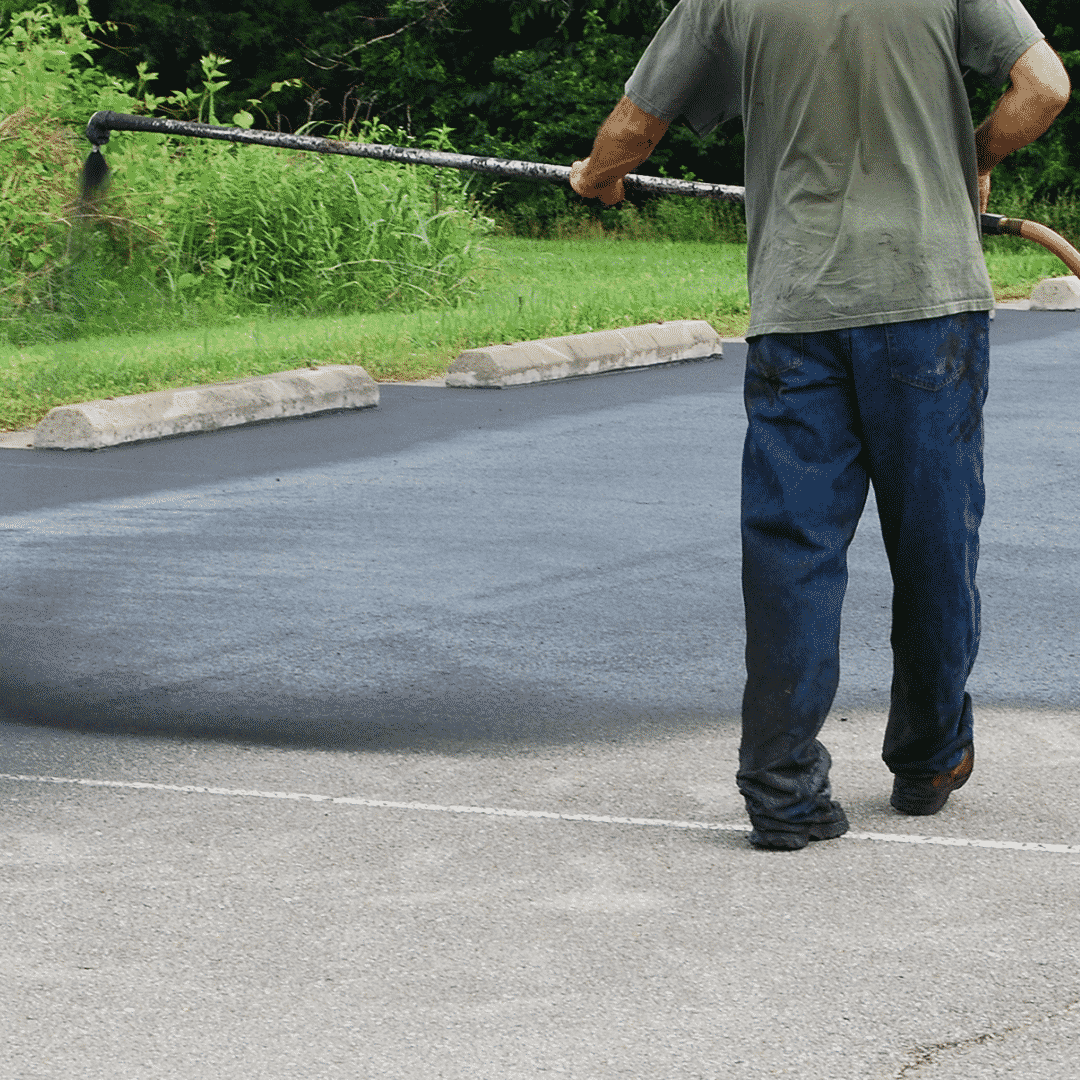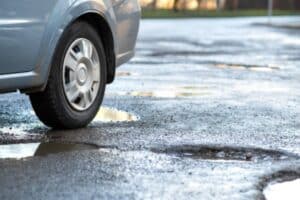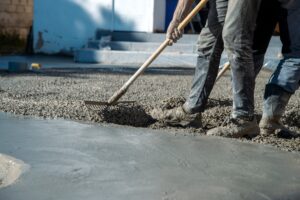If you’re responsible for the upkeep of a parking lot, driveway, or another asphalt surface, you may be wondering what goes into asphalt sealcoating. It’s a good question! Sealcoating is an important part of asphalt maintenance, and it’s important to use the right materials to get the best results. In this article, we will discuss asphalt sealcoating materials, their important properties, and how these materials combine to protect your asphalt.
What is sealcoating made of?
Asphalt sealcoating is made up of several key ingredients, each playing a crucial role in protecting and preserving your pavement. The main component is asphalt emulsion, a liquid mixture that contains tiny asphalt particles. This emulsion forms a strong barrier against water, UV rays, and everyday wear, helping to extend the life of your asphalt surfaces.
But asphalt emulsion isn’t the only ingredient. Several other materials are blended in to enhance performance:
- Water – Acts as a carrier, keeping the sealcoat at the right consistency and preventing it from drying too quickly during application.
- Binder – Helps hold everything together, preventing separation and increasing the sealcoat’s durability over time.
- Additives – Adjust the color, thickness, and longevity of the sealcoat, allowing for customization based on different project needs.
- Polymers – Strengthen the sealcoat, making it more resistant to heavy traffic and harsh weather conditions.
- Fillers – Help fill in small cracks and imperfections, creating a smoother, more uniform finish for better protection and appearance.
Together, these ingredients work to create a long-lasting, protective layer that not only shields your asphalt from damage but also helps repair minor cracks and wear. With the right blend of materials, a quality sealcoat keeps your pavement looking great and performing well for years to come.
Sealcoating Additives: Examples and What They Do
There are many different asphalt seal coating additives on the market, each with a distinct role. Some additives may assist in drying the sealcoat fast, altering sand suspension, increasing water repellency, increasing flexibility, or providing salt and petrochemical resistance.
Some common asphalt sealcoating additives include:
Anti-Stripping Agents
These are added to the asphalt emulsion to help prevent the sealcoat from stripping off the asphalt surface. For example, if you live in an area with a lot of snow and ice, an anti-stripping agent can help to prevent the sealcoat from being stripped away by the elements.
There are two types of anti-stripping agents for asphalt: hydrated lime and liquid anti-strip. Hydrated lime is the better additive because it minimizes the stripping potential. When added to the asphalt mix, hydrated lime increases the rate and strength of the binding between the aggregate and binder. Liquid anti-strip can also increase the adhering forces between the aggregate and the asphalt.
The risk of moisture-induced stripping is reduced when limestone and marble aggregates are used, and therefore hydrated lime is typically not needed. Granite and quartz-rich aggregates are more susceptible to stripping, so anti-strip agents such as hydrated lime may be needed to prevent the asphalt from prematurely failing.
Slip Resistance Additives
These additives are added to increase the slip resistance of the finished sealcoat. This can be important for areas where pedestrians or vehicles may be using the surface. For example, if you have a parking lot, you may want to add a slip resistance additive to your asphalt sealcoating to help prevent accidents.
One common slip resistance additive is calcium chloride. When added to the sealcoat, it creates a thin film on the surface that increases traction. This can be important for both wet and icy surfaces. Slip resistance additives can also help to increase the lifespan of the asphalt sealcoat by preventing wear and tear.
Other slip resistance additives include:
- Sand: This is the most common slip resistance additive. It is added to the sealcoat to create a rough surface that provides traction.
- Grit: Grit is another type of slip resistance additive that is added to the sealcoat. It is a coarser material than sand and provides more traction.
- Polymers: Polymers can also be added to the sealcoat to increase slip resistance. They work by creating a chemical bond between the aggregate and asphalt.
Colorants
Colorants are used to change the color of the finished sealcoat. They are typically added in small amounts to avoid making the sealcoat too dark.
One common colorant is carbon black. Carbon black is a fine, black powder that is added to the sealcoat to make it darker. It also helps to increase the UV resistance of the sealcoat.
Other common colorants include:
- Pigments: Pigments are used to create a wide range of colors in the sealcoat. They can be added to the asphalt emulsion or to the top coat.
- Dyes: Dyes are similar to pigments, but they are thinner and can be mixed with other additives to create custom colors.
- Flakes: Flakes are added to the sealcoat to create a sparkly or glittery effect. They are typically made of mica, glass, or metal.
- Glitter: Glitter is similar to flakes, but it is usually made of plastic. It can be added to the asphalt emulsion or top coat.
As you can see, there are a variety of asphalt sealcoating materials that can be used to create a variety of colors and finishes. When selecting materials, it is important to consider the climate and conditions where the sealcoat will be applied. This will help you choose the right materials for your project.
Foam Control Agents
These agents help control the amount of foam that is produced during the sealcoating process. Excessive foam can cause problems with the application of the sealcoat, so using a foam control agent can help to ensure smooth results.
There are a few different types of foam control agents:
- Foam inhibitors: These agents work by preventing the formation of foam. They are typically added to the asphalt emulsion before it is mixed with the other ingredients.
- Defoamers: These agents work by breaking down the bubbles that have already formed. They can be added at any point during the sealcoating process.
- Antifoaming agents: These agents work by both preventing the formation of foam and breaking down existing bubbles. They are typically added to the asphalt emulsion before it is mixed with the other ingredients.
Which type of foam control agent you use will depend on your specific needs.
Additives for Improved Flow and Leveling
These additives are added to the asphalt emulsion to help improve the flow of the material. In a coating, leveling and flowing additives do a variety of jobs. They are mostly for reducing or eliminating surface flaws such as craters, fisheyes, orange peel, and pinholes.
There are a few different types of flow and leveling additives that can be used:
- Wetting agents: These agents work by reducing the surface tension of the asphalt emulsion. This allows the asphalt to wet out the surface more evenly and prevents it from beading up.
- Flow modifiers: These agents work by thickening the asphalt emulsion. This helps to improve the flow of the material and prevents it from settling out.
- Leveling agents: These agents work by leveling out the asphalt emulsion. They help to eliminate any surface flaws and make the sealcoat smooth.
Adding these substances to the uncured film will help it wet out, flow and level better. This will also help with air release, pigment dispersion and getting the film to stick better to the substrate.
UV Protectants
UV protectants are added to asphalt pavement surfaces sealcoat to help protect them from the sun’s ultraviolet rays. Ultraviolet radiation can cause the asphalt to degrade over time, so adding a UV protectant can help to extend the lifespan of the sealcoat.
There are a few different types of UV protectants:
- Organic UV absorbers: These agents work by absorbing UV radiation from a surface such as an asphalt driveway or lot. They are typically added to the asphalt emulsion before it is mixed with the other ingredients.
- Inorganic UV absorbers: These agents work by reflecting or scattering the UV radiation. They can be added to the asphalt emulsion or applied as a topcoat.
- UV stabilizers: These agents work by slowing down the degradation of the asphalt caused by UV radiation. They can be added to the asphalt emulsion before it is mixed with the other ingredients or applied as a topcoat.
Adding a UV protectant is a good way to help protect your asphalt sealcoat from the sun’s UV rays.
Additives that Improve Adhesion
These additives help to improve the ability of the asphalt emulsion to adhere to the asphalt surface. This is important, as it helps to ensure that the sealcoat will stay in place and not peel or chip off over time.
There are a few different types of adhesion additives that can be used:
- Tackifiers: These agents work by increasing the asphalt’s ability to adhere to the surface. They are typically added to the asphalt emulsion before it is mixed with the other ingredients.
- Polymers: These agents work by forming a bond between the asphalt and the surface. They can be added to the asphalt emulsion or applied as a topcoat.
- Adhesion promoters: These agents work by improving the wetting ability of the asphalt. This allows it to better adhere to the surface. They are typically added to the asphalt emulsion before it is mixed with the other ingredients.
Adding an adhesion additive is a good way to help improve the ability of the asphalt sealcoat to adhere to the asphalt surface.
Additives that Improve Weather Resistance
These additives help to improve the resistance of the sealcoat material to weathering, making it more durable.
There are a few different types of weather resistance additives:
- Antioxidants: These agents work by preventing the asphalt from oxidizing. They can be added to the asphalt emulsion before it mixes with the other ingredients.
- UV stabilizers: These agents work by slowing down the degradation of the asphalt caused by UV radiation. They can be added to the asphalt emulsion before it mixes with the other ingredients or applied as a topcoat.
- Fungicides: These agents work by preventing the growth of fungi on the asphalt surface. They can be added to the asphalt emulsion before it is mixed with the other ingredients or applied as a topcoat.
All these asphalt sealcoating additives serve an important purpose in the creation of a high-quality sealcoat. When choosing asphalt sealcoating materials, be sure to select a product that contains the right mix of ingredients for your needs.
Two Types of Sealcoating
There are two types of sealcoating: coal tar-based sealers and asphalt-based sealers. Both types have their own advantages and disadvantages.
Refined Coal Tar Based Sealers
Refined Coal Tar Sealer (RTS) is the thick, black liquid that results from the distillation of bituminous coal. This type of binder is consists of thousands of chemicals and has a different molecular structure than asphalt. It is not affected by the weather, the sun’s UV rays, salts, oil, gasoline, fats, or other petrochemicals.
Coal tar-based sealcoating has a significantly longer lifespan than asphalt-based sealer. It can last up to three to five years before reapplication. Coal tar-based sealers are also more resistant to staining and stripping, and they provide better color retention.
The main disadvantage of coal tar-based sealers is that they are not as environmentally friendly as asphalt-based sealers. They also have a strong odor, which can be unpleasant for people nearby. For these reasons, coal tar sealing is not used in many places. For example, in Utah, few if any asphalt sealing companies provide this service.
Asphalt Emulsion Based Sealers
Asphalt emulsion is consists of three main ingredients: asphalt, water, and emulsifiers. In general, asphalt emulsion is the most common type of sealcoat material.
Asphalt emulsion-based sealers have a shorter lifespan than coal tar-based sealers. They typically need reapplication about every three years. Asphalt emulsion is also less resistant to staining and stripping than coal tar-based sealer.
The main advantage of asphalt emulsion-based sealers is that they are more environmentally friendly than coal tar-based sealers. They also have a much lower odor and toxicity than coal tar-based sealers.
Sealcoating Products: DIY vs Professional Asphalt Sealcoating Materials
When it comes to asphalt sealcoating, there are two main types of products available: professional and DIY.
Professional Sealcoating Products
Professional sealcoating products are designed for use by professional contractors. These products usually contain a higher percentage of solids and a higher quality of asphalt emulsion, which results in a more durable and longer-lasting sealcoat. Additionally, professionals use specialized equipment to apply the sealcoat, which ensures a more even and consistent application.
Professional products can be a good option if you want the best possible results for your asphalt sealcoating project. However, they can also be more expensive than DIY asphalt sealcoating materials.
DIY Sealcoating Products
DIY sealcoating products are designed for use by homeowners and DIYers. Do it yourself asphalt sealcoat can be a good option if you are on a budget or if you want to apply the asphalt sealcoat yourself. However, it is important to note that these products may not provide the same level of protection as professional asphalt sealcoating.
For those interested in doing it themselves, you must buy sealcoating solutions with a specific formulation designed to endure, resist, and tolerate sitting on the store shelf for an extended period of time.
Because of the unique quality that is given to goods manufactured to stand on shelves and wait for purchasers, DIY methods come with a cost. The solution may not provide the same level of protection as a professional sealcoat, but it will protect your asphalt to a certain degree.
Therefore, when choosing an asphalt sealcoating product, be sure to consider your needs and budget. If you want the best possible results, a professional sealcoating product may be the best option. However, if you are on a budget or want to apply the sealcoat yourself, a DIY asphalt sealcoating product can help.
When you need asphalt sealcoating materials, contact Superior Asphalt, LC.
When it comes to your asphalt sealcoating materials, don’t take chances — call the pros at Superior Asphalt LC for the highest quality materials and professional application. We offer asphalt sealcoating, repair, and maintenance services for commercial and residential customers. Contact us today for more information!




